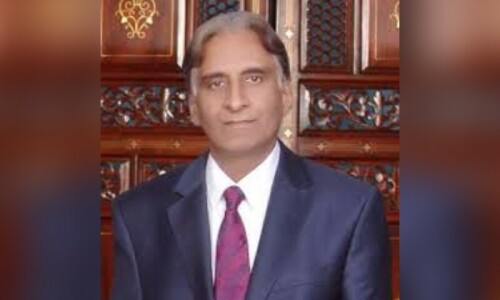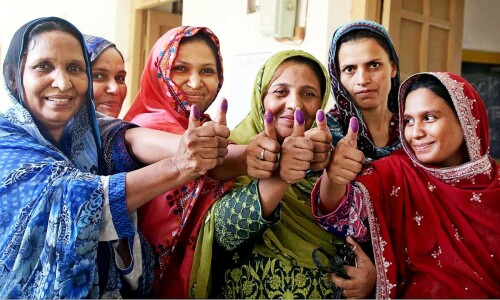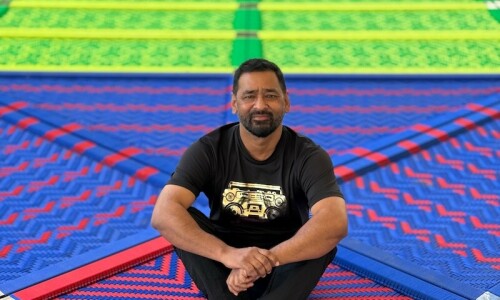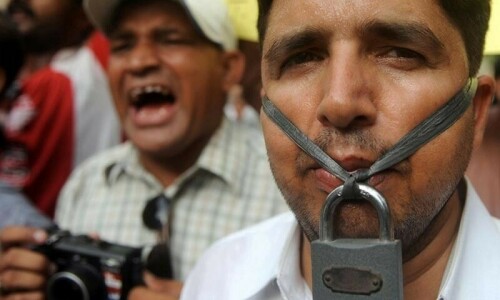 KARACHI, Feb 6: Unless the borders of Sindh are sealed and the inflow of weapons into the province from up-country is stopped, all efforts to cleanse Sindh of illegal firearms are bound to fail.
KARACHI, Feb 6: Unless the borders of Sindh are sealed and the inflow of weapons into the province from up-country is stopped, all efforts to cleanse Sindh of illegal firearms are bound to fail.
Sindh Home Minister Dr Zulfiqar Ali Mirza said this on the floor of the house during Friday’s session of the provincial assembly as he faced a barrage of legislators’ queries during an animated question hour.
Along with the workings of the home department, Minister for Jails Haji Muzaffar Ali Shujra also fielded questions from members of the house.
“An illegal firearm is an illegal firearm. There is a continuous process against illegal weapons. However, under special circumstances operations are carried out as per requirements. We have even gone door-to-door (to flush out illegal weapons),” the home minister said in reply to a supplementary question about whether the government had a specific de-weaponisation policy, especially considering the violence that wracked Karachi in November 2008. “The voluntary deposition scheme (of weapons) was not fruitful,” he added.
The Pakistan People’s Party’s Humera Alwani had originally asked the home minister for the number of arms licences issued between Jan, 2005 and April 30, 2008, while also inquiring about what the government intended to do to recover unlicensed arms and de-weaponise society.
In his written reply, Zulfiqar Mirza gave the details for Sindh’s 23 districts. Karachi had the highest number of arms licences issued (4,350) while Umerkot had the least (450). The full data of four districts (Sanghar, Khairpur, Jacobabad and Kashmore) could not be provided as the record was either stolen or destroyed in the rioting following Benazir Bhutto’s assassination.
“There are no rules in relation to recovery and punishment [sic] of unlicensed weapons at present. There is no special drive for recovery of unlicensed weapons,” Dr Mirza had said in his written answer.
Unlimited quota
In reply to a question regarding the computerisation of the arms licences’ record, the minister said a summary in this regard was with the chief minister, adding that the project required the “investment of a huge amount”. As for the arms licences’ quotas, Dr Mirza said that now only the home secretary and the home minister could issue the licences. The home minister’s quota was unlimited.
Syeda Marvi Rashdi of the Pakistan Muslim League-Functional asked the home minister about a drive the government had launched on Dec 6, 2008. She said it bore no result and the government could impose the Illicit Arms Recovery Act 1991 to control the spread of illicit guns. “Does the government plan a drive?” she asked.
The minister replied that there was a misunderstanding as the drive referred to by the member concerned the registration of legal arms. “If need be we will initiate a drive (against illegal weapons).” He compared the situation vis-à-vis the presence of illegal arms in the province thus: “If it is raining, you don’t sweep the water out of your house while it is still raining. You wait for the downpour to stop. We must stop the inflow of weapons from upcountry.”
A member asked Dr Mirza why the home minister’s quota of issuing arms licences was unlimited. “People were misusing their authority. That’s why I issued the order. It was to prevent fake licences. People can still apply through the DCOs. I’ll give them permission.”
‘I have 350 arms licences’
In a rather starling disclosure, the home minister said he himself had 350 arms licences when a member asked how many licences could be issued per person. “A law-abiding citizen can have 1,000 licences. I have 350.”
Humera Alwani had asked the minister for the number of public safety committees, district-wise, working in Sindh along with their performance details.
There were no district public safety commissions functioning, said Zulfiqar Mirza in the written reply. “In 2002 these commissions were established in 12 districts of Sindh but their term of office expired after three years in terms of Section 45 of the Police Order 2002. (Though) the committees are not functioning, their secretaries, who are government officials, continue to work in the 12 districts,” he added, listing the districts.
Marvi Rashdi asked the minister that if the committees were not functioning anymore, why were the officers still working. The home minister replied that the government was trying to restart the committees. However, from April to May, 2007, 23 summaries had been sent to the then chief minister. These were still pending with the chief minister and the speaker, he added.
Jam Tamachi Unar, chairman of the Public Accounts Committee, suggested that rather than political figures, a district sessions judge should head the committees, as was originally envisioned. “If I am made the head, I will include my own people,” to which the home minister retorted: “You must decide if it’ll be a PCO judge or a non-PCO judge.”
Jails’ capacity
Humera Alwani had asked Muzaffar Shujra about the details of the province’s jails, as well as if it was true that prisoners could not be produced in court due to the shortage of police vans.
In his written reply, Mr Shujra said that the total capacity of Sindh’s 20 jails was 9,541 people. He said it was true that prisoners could not be produced in court due to the shortage of vehicles. He said the government had sanctioned the purchase of 153 prison vans, while the shortage of police personnel should also be made up.
In a supplementary question about the total number of prisoners in jail, the minister said over 18,500 inmates were lodged in jail, while the prisons only had the capacity to hold half as much.













































Dear visitor, the comments section is undergoing an overhaul and will return soon.